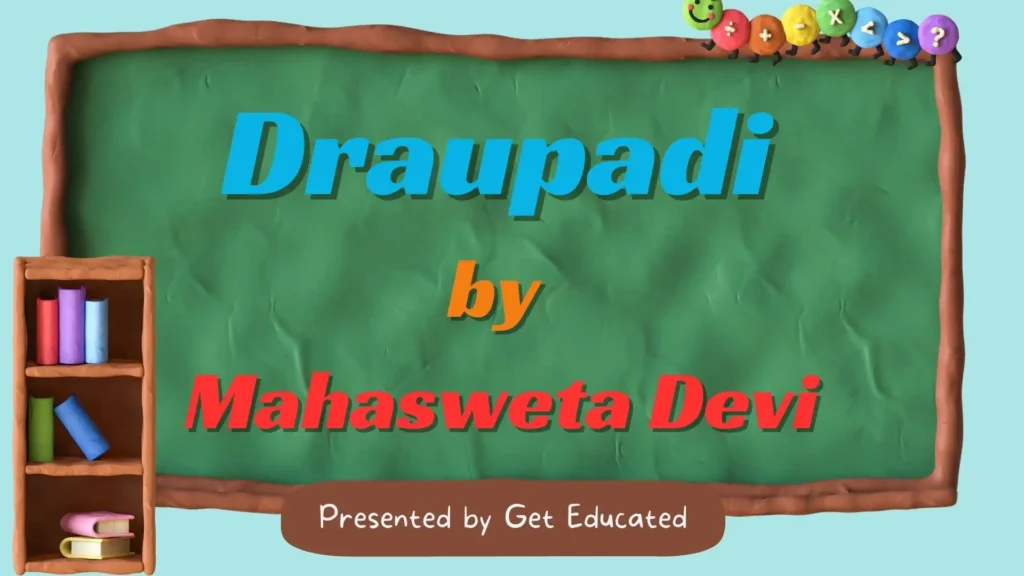
One of writer and activist Mahasweta Devi’s (1926-2016) most widely read books is Hajar Churashir Ma (Mother of 1084), which was adapted for theatre and film. Set in the backdrop of the violent Naxalite movement of 1970s Bengal, the novel begins with a mother waking up to the news that her son is dead and reduced to a number. The short story of “Draupadi” (Devi, 1997) written by Mahasveta Devi is a Bengali piece of work that has gained widespread popularity in the recent years. It highlights the life of a tribal Naxal woman who fights for her own cause and for her people who are the deprived class.
Draupadi is a story about Dopdi Mehjen, a woman who belongs to the Santhal tribe of West Bengal. She is a Robin Hood-like figure who with her husband, Dhulna, murders wealthy landlords and usurp their wells, which is the primary source of water for the village. The government attempts to subjugate these tribal rebel groups through many means: kidnapping, murder, rape. Dopdi is captured by Officer Senanayak who instructs the army officers to rape her to extract information about the rebel uprising.
In great Bengal Famine of 1943, starving people died in front of well stocked food shops. A peasant differs from a landless laborer in terms of ownership position since he cultivated his own land. The migrants like Dopdi or her husband Dulna Majhi are forced to work for wages well below government fixation of minimum wages. They are not fighting for bigger academic issues. They are fighting for bare minimum needs to survive. The target of these movements was the long established oppression of the landless peasantry and itinerant farm workers, sustained through an unofficial government- landlord coalition. The Indian government was able to crack down the rebellion with exceptional brutality on the Naxalites destroying the rebellious sections of the rural population, most significantly the tribal The whole plot revolves around Dopdi Mejhen’s career as a Naxalite. The term ‘Naxalites’ also referred to as the ‘Naxals’ describes groups that adopt violent strategies against feudal landlords and others in power who exploit the poor landless laborers and the tribal people. Their claim is that they are fighting exploitation and oppression in order to create a society devoid of class structures and hierarchies.
The story has its backdrop, the Naxalbari movement of Bengal, which started as a rural revolt of landless workers and tribal people against landlords and money lenders. The misery of a tribal woman as compared to aristocratic woman is far more dreadful. Rape is the worst recognition of sexual violence against women. Mahasweta Devi’s tribal Dopdi is fighting for her survival, for food and for water. The writer etches out the plight of the tribals in words. She depicts how utter helplessness can finally lead to resistance or even rebellion. They went underground for a long time and they are on the list of wanted. They used the technique of guerilla warfare to compete with their enemy. Guerilla warfare is supposed to be the most despicable and repulsive style of fighting with primitive weapons. Dopdi and Dulna belong to the category of such fighters, for they too killed with hatchets and scythes, brows and arrows.
Suggested Reading
Draupadi as a Subaltern Text
Towards the end of the story where she has been subjected to multiple rapes by the police officers in the camp, who apprehended her. Draupadi was raped the entire night by all the police officers on the command of their superior “Senanayak”. Draupadi when she opens her eyes finds herself tied in a spread-eagled positions and the wounds on her body was enough to tell her that there were many of them. The story has a line, that explains the helpless condition of the woman, that is, “Suddenly she hopes against hope. Perhaps they have abandoned her. For the foxes to devour” – this statement tells us about the psychological condition of Draupadi, that she hopes better that she is devoured by the foxes than to be raped and mutilated again and again by the policemen. This however reflects the mindsets of the women in the Indian society, that nothing is above modesty of a woman. However, as the story progresses, we see that even after such brutalities, Draupadi is strong enough to confront Senanayak who was afraid of her, for the first time he was afraid of an unarmed victim. The brutalities couldn’t break her spirit. She laughed indistinctively and walked naked, stating that there was not one man who she should be ashamed of there.
This highlights the birth of a phoenix bird from its own ashes. The phoenix is a mythical bird who raises from its own ashes, after it dies, being burnt in a fire. This bird gives a number of metaphorical meanings. The rise in itself symbolises revolt, that even if the outwardly forces strive to break somebody, that person can still turn around and stand for themselves. The same instance happened with Draupadi. The rape and the humiliation along with the number of sexual injuries, signifies the fire, that turns the phoenix into ashes. The actions of Draupadi the next morning she was told to come to the superior, metaphorical signifies her rebirth as a powerful spirituality, who is not afraid of anybody.
Operation Jharkhani gains momentum under the leadership of Senanayak, ‘a specialist in combat and extreme left politics. He is a seasoned military strategist with mastery over ‘theories’ on how to defeat the enemy by learning their language, using tribal informants and ‘countering techniques.-“In order to destroy the enemy, become one.’ Very soon Dopdi Mejhen is apprehended and understanding her defeat she readies herself for the next action of warning her comrades:“Now Dopdi spreads her arms, raises her face to the sky, turns towards the forest, ululates with the force of her entire being. Once, twice, three times. At the third burst the birds in the trees at the outskirts of the forest awake and flap their wings. The echo of the call travels far.”
With her capture, the process of co modification of her body starts. She is no more treated as an activist with a cause but a mere body, a possession or war booty, But before going for his dinner, Senanayak, issues orders to his men- of course after her official interrogation to make her and do the needful’. In an attempt to subjugate her mind, body and soul, Dopdi is raped repeatedly by a no. of men as she loses consciousness time and time again during her ordeal. Unlike other passive rape victims, Devi does not let her heroine ‘Draupadi’ suffer in silence. With unconquerable spirit, the naked and bleeding Draupadi faces all her rapists defiantly, out resisting the sexual flouting of her body. Mahasweta Devi gives voice to the voiceless unfortunate of the earth, her literary output is an attempt to shake the conscience of the citizens, to make them notice, identify and analyze what goes unnoticed, unheard by the naked eye.
Through the compelling interplay of politics and history, Devi exposes the irony of the patriarchal hegemonistic societies that eulogize the idea of protecting a woman’s honor at all cost but given a chance, violates her without having any quam. Dopdi, the central character, is representative of millions of tribal women who are oppressed, marginalized and victimized by the agents of politics. These instances have not only metaphorical values within themselves but also are a great teaching for the females and the society. Apart from this, the story has a number of tinges of feminism, showing that an empowered Draupadi can face all the men who brutally raped her last night when she was helpless. And a few hours they are afraid of her spirit. Mahasweta Devi makes it a prominent point that apart from being a tribal, the way she reacts to the atrocities that she faced, it makes the world realise that the subalterns can speak about their atrocities and she being the leader can terrify all those who oppressed her just a few hours ago.
Further the sharp comparison of the mythical Draupadi with the protagonist of this story as the tribal queen through the literatures above is like the history repeating itself. The mythical Draupadi too, had a very difficult life and had to face humiliation in front of a number of men in an assembly where she was disrobed. The same happened with Draupadi the leader of the subalterns as she was brutally raped by all the police officers that were present in the camp that was found to apprehend her.
“The story is a moment caught between two deconstructive formulas: on the one hand, a law that is fabricated with a view to its own transgression, on the other, the undoing of the binary opposition between the intellectual and the rural struggles. In order to grasp the minutiae of their relationship and involvement, one must enter a historical micrology that no foreword can provide. Draupadi the name takes us in long back in a hall, where the enemy chief begins to pull at her sari. Draupadi silently prays to the incarnate Krishna. The idea of sustaining law (dharma) materializes itself as clothing and as the king pulls at her sari, there seems to be more and more of it. She is infinitely clothed and cannot be publicly stripped. It is one of Krishnas miracles. But Mahasweta Devis Draupadi, gang raped by police, refuses to be clothed by men again. In Draupadi, what is represented is an erotic object transformed into an object of torture and revenge where the line between (hetero) sexuality and gender violence begins to blur.”
The critic well-explicates the meaning of disrobing – while the Draupadi of the epic gets her robe miraculously, the modern day defiant Dopti Mehjen refuses to be clothed thus making all those assembled there puerile and naked. Both the Draupadis are symbols of retaliation and stand as monumental role-models.
